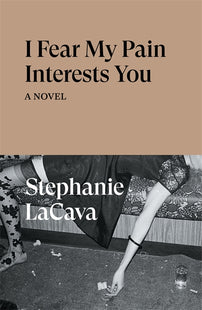Nilb, mun, mud: Notice
Short fiction from Stephanie LaCava.

I re-read Notice when I was in rehab in Connecticut, at a place with stone geese finials and a brick chapel. I was there getting off drugs, medicine, some would say. It was a joke to think I was clean. The doctor called some of pills, the “analog” version of others. I didn’t know what that could possibly mean. Still, this is the analog version of an old story. It happened without electronics, in a controlled environment, with shitty food and insane company. Not unlike certain families.
A few days in, during our daily walk, I asked the physician tech if the doors to the chapel were left open. So far, every door and window had been sealed shut, screwed flat to the wall. He didn’t answer me out loud, though his expression asked that I remember where we were wasn’t much removed from an asylum.
The town itself was not that far from Bedford, New York where Lewis was born. Bedford, New York borders Yorktown, the town where I grew up. My name is Neena, which is (phonetically) the same name Lewis goes by when she meets and sleeps with Ingrid, the wife of one of her sadistic clients.
The first sentence of Lewis’ book is admitting denial already: “for the longest time I didn’t call it turning tricks.” I guess I could understand this as it related to my own behavior, to more than one of them, really.
Lewis continues on, “And while it’s true I needed the money that’s not all I needed from it.” A few sentences later, “What the extra need is, the thing besides money? I’ve never pinned it down. I know it’s there, though.”
The first time I read the book, a paperback edition, given to me by someone I thought was important. Turns out he was, but not in the way I thought he’d be. This was confirmed by another book exchange. A woman who I was always suspicious of, told me about a novel she was reading in French, which felt strange as I had given the English version to him the summer prior. He had said he was surprised he’d never heard of it, and she would have only heard of it through him. An intimate exchange, cheapened, used to seduce. Writing is the same. Subtext haunts a conversation, but it fucks you when you write books.
Page twenty-one, Lewis: “I knew this was not a good thing to pursue. That it would make me feel something, which naturally is about the last thing you want.” She is talking about the possibility of falling for someone she is fucking. In this case, the wife of a man who pays her. Later she picks up this strand when she meets another woman she falls for: “That those feelings would cause the same kind of trouble they had with Ingrid. That If I could just keep from having them, I’d stay safe.”
Even before I got clear-headed, I could have told you Lewis and I are—were?—funny opposites. She came on high alert when annihilation was near. I had the siren without the alert. You go towards a blinking light when it doesn’t make splitting noise. At least, I do.
I will tell you a secret about detoxing, and it can only happen if you time it right. The techs check the rooms on the unit every fifteen minutes. The door opens, they see you breathing, then walk in and look in the bathroom, in the shower. When they leave, you’re free for fourteen minutes. What absolutely no one tells you, is that if you masturbate to get through the withdrawal it causes an insane sharp headache. This feeling that can only be explained as pre-aneurysm, but maybe that’s hyperbolic and hard to prove. It’s not a fluke because it happened to me twice. Instead of coming, my brain started to sear.
Caught on the camera in the room: me stumbling out of the bathroom (no cameras allowed there), clutching my head. Lying down on the institutional bed, clutching my head. Kicking the wall, clutching my head.
The room is both old saint-cell and fainting hospital fancy. Most have roommates. I did not. The desk looks like cheap Regency revival; the chair is Memphis Group Ikea. Everything sharp is sanded or bolted down. Some drugs do this too. Or the reverse.
Across from the first mate bed, above the desk, a manipulated photograph of a sunrise over fir trees. It must be a sunrise, because who would hang the sunset version there, in that soft-edged wooden frame. At the time of day that corresponds, the shadow of the facing window shows up deranged in the slant of the wall. The two windows make offerings out of daylight, unable to open and breathe. Saint Vitalis of Gaza is the patron saint of prostitutes and day-laborers.
The fifteen minute check-ins carry on through the night uninterrupted. If you ask to lock the bathroom door, the tech doesn’t have to step inside the room. But if you get up and need the toilet, well, the door is locked. Wake up for good and stumble out. Look at the clock. Morning time. In the main area, the sitting area in the bay window is still empty. There is a box of crayons on the bookcase. I hide in my room and read.
“His dick helped me by the way it hurt. Kept me from thinking anything for a while until it got where it didn’t hurt, but did the opposite.” Neural pathways and pleasure.
Before I arrived, my best friend tells me: Stay Alive. See what happens.
Or maybe it was Stay Alive; see what happens.
Either way. It was what was happening. In the evening group meeting, everyone has to go around and respond to a list of prompts. The first: a goal. Then, a coping skill. The goal seemed self-evident.
Reading was often the answer to the second.
I was reading Notice, someone else Clarice Lispector’s A Breath of Life. Things kept happening that called for Helvectica subtitles (commentary as the voice was sometimes Up high, off-stage): You can’t make this Up.
That day a new charge arrives to the unit. She ends all her story tells with “It happens every single day.”
Lewis asks someone who betrayed her, someone she came close to falling love with, “Why” she shows up to see her at the asylum-hospital after having already left her? The woman replies, “I didn’t want you to think I deserted you.”
This is what confuses me about my own life, these characters that keep making appearances. They come in with certain platitudes and exit with other ones. Like the Aussie ex I knew I didn’t love who reached out to my best friend after I told him not to tell anyone about my status. He wasn’t making a bid for the relationship—which would have been okay. No, he wanted to be sure that if I was in a twelve-step program it wouldn’t make me reveal anything to anyone that would cause him trouble.
In the next group meeting, the leader asks When does time pass quickest for you?
When I’m falling in love.
In Australia they use the phrase “‘fall’ pregnant," but they don’t say “get in love.”
Lewis is falling in love. Maybe I am too, with someone new. Lewis is falling in love with Beth, but it’s confusing because Beth is staid but also, somehow, a siren.
“I could almost offer this explanation and believe it myself while still knowing the other. But then having two things going on at the same time is not something I question. It’s just something I do. Something we all do. Everyone does. All the time.”
Lewis doesn’t run the risk of falling in love with men.
“No matter how hard I wanted to, or pretended to, I couldn’t use Beth for escape. I’d never been able to. What she offered was its opposite. She plunged me into the very things I’d needed to get away from. Swamped me with them through the same means I’d always used to evade them.”
Two clients come to find Lewis and this is also confusing because they are not after sex—not at first. And then I think I see why the tricks and what the-extra-need-is. It couldn’t be pinned down because it was the need to pin down. A system of transactions that were clear.
Service. Payment.
The techs at the hospital. Is their kindness true when it’s covered by insurance? When they break a rule to help you out, is it more powerful than the no-context gesture? Because it means they could lose their job?
One of Lewis’ clients, Burt finds her (“Someone I could easily handle and therefore, I guess, boring.”) They do coke, an occasional Quaalude. “I couldn’t conceive he was playing me and so I didn’t worry much along those lines… Someone I didn’t have to do and so, if my body could rest, he could fuck my mind all he wanted.”
In the end, Burt and his friend Jeremy both return to violently fuck her. With a pistol. That’s different than, “pistol in-hand.”
This is too much, but just before this is almost enough.
“Something to feel besides already dead.” And when it’s over, it’s never really over. Both love and trauma end even when they persist. “I carried that deadness to bed with me. And I carried with it a knowledge that I’d had all along. That I should’ve died that night—it’d be the best chance I’d had so far”
Stay Alive. See what happens.
[book-strip index="1"]


